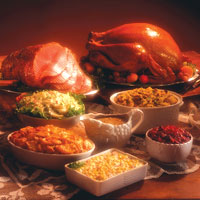Observation
Temptation: It Depends on How You’re Feeling
 From gravy-soaked turkey to home-baked cookies, the holiday season is full of temptations. In a series of experiments published in Psychological Science, researchers examined the role visceral states — such as hunger — play in people’s response to temptation. In one experiment, two groups of smokers rated how pleasurable they thought smoking was and were then told they would be given money for delaying smoking. Smokers who were craving cigarettes rated cigarettes as being more pleasurable than those who were not craving a cigarette. Also, the participants who had cravings were also more likely to smoke instead of taking the money. Previous theories concerning visceral states and self control imply that reacting to a visceral state is a hedonic response, but the authors of this study suggest that visceral states influence temptation by modifying cognitive resources such as reasoning.
From gravy-soaked turkey to home-baked cookies, the holiday season is full of temptations. In a series of experiments published in Psychological Science, researchers examined the role visceral states — such as hunger — play in people’s response to temptation. In one experiment, two groups of smokers rated how pleasurable they thought smoking was and were then told they would be given money for delaying smoking. Smokers who were craving cigarettes rated cigarettes as being more pleasurable than those who were not craving a cigarette. Also, the participants who had cravings were also more likely to smoke instead of taking the money. Previous theories concerning visceral states and self control imply that reacting to a visceral state is a hedonic response, but the authors of this study suggest that visceral states influence temptation by modifying cognitive resources such as reasoning.





APS regularly opens certain online articles for discussion on our website. Effective February 2021, you must be a logged-in APS member to post comments. By posting a comment, you agree to our Community Guidelines and the display of your profile information, including your name and affiliation. Any opinions, findings, conclusions, or recommendations present in article comments are those of the writers and do not necessarily reflect the views of APS or the article’s author. For more information, please see our Community Guidelines.
Please login with your APS account to comment.